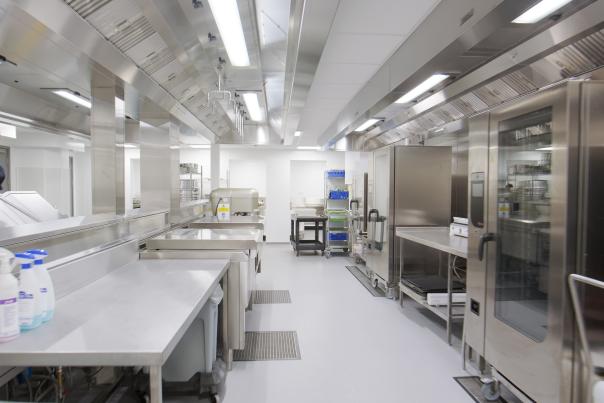
Emma Honnywill, transformation operational manager at the Trust supporting facilities and catering projects, said: “The CPK is vital to support not only the reconfiguration programme across the Trust, but also to deliver improved quality, choice and flexibility of our food offerings for our patients, whilst reducing waste.
“As part of the department transformation we needed the flow of the building to work more efficiently than the old facility, which we had outgrown, and to be able to produce enough dishes to meet our patients’ needs – particularly when we complete reconfiguration and upscale.”
She added that the CPK used MKN cooking equipment linked to the Sicotronic energy optimisation system and this had ‘transformed’ catering operations across Trust, which includes the Royal Bournemouth, Poole and Christchurch Hospitals.
The design and delivery of the new facility was driven by MYA Consulting and HCE Foodservice Equipment.
It has been developed to enable the Trust to continue to deliver a scalable patient catering model for up to 3,000 patient meals per day as the overall project progresses, across the three sites which span a six-mile radius of the central kitchen.
In total, it will be required to produce around 20,000 meals each week for patients and retail services, once it is up to full capacity.
The kitchen team works on a cook/freeze model, with batch cooking at scale which is then portioned, levelled, sealed and frozen.
Regen trolleys are then used to regenerate meals and deliver to wards.
At the heart of the operation chefs have access to two MKN FlexiChef multifunctional cooking appliances, five FlexiCombi combi ovens, two 200-litre multi-functional mixing kettles and two Optima 850 induction hobs.
In addition, MKN’s appliances are connected to the Sicotronic energy optimisation system from kitchen technology specialists Ki-Tech Solutions.
Set up in this way allows the system to overcome the issue of insufficient capacity in the electrical system, a problem increasingly faced by commercial kitchens as they transition from fossil fuels to electric power.
Instead, it balances the load to meet peak power demand with a lower electrical supply than would be anticipated from the initial project designs, while also helping to future-proof the kitchen for any future expansion.
Collaborative project success
The project and design were led by MYA Consulting, an international hotel and catering consultant that delivers specialist design and in-depth advice on catering facilities, and management for critical projects.
Appliances were supplied and installed by HCE Foodservice Equipment, supporting the main contractor Amiri Construction, all in close collaboration with MKN and Ki-Tech Solutions to deliver enhanced support, commissioning and user training.
Innovations to drive kitchen benefits
MKN’s new FlexiChef multifunctional appliance is one of the key products in the new CPK. It replaces the job of numerous pieces of cooking equipment, redefining processes from pressure cooking to boiling to shallow and deep-frying, and making almost anything possible with enhanced speed and efficiency. It is fitted with MKN’s SpaceClean, which it claims is the first and only fully automatic cleaning system for professional cooking pans.
The Trust uses a Team Unit comprising two FlexiChefs (size 2 and size 3) to prepare everything from rice pudding to steak and kidney pie, with up to 800 portions in a single batch.
In addition, two 200-litre multifunctional mixing kettles are delivering consistent food quality in less time by automating key processes that would previously have been completed manually.
Suitable for cooking, stirring, mashing and whipping with a range of accessories and a cook-chill option, the kettles free up both labour and cooking line capacity.
The Trust has also installed five MKN new FlexiCombi combi steamers (two x 20.1 and three x 10.1). They include the FlexiRack capacity concept, which MKN says offers more than 50% more capacity than appliances using conventional GN1/1 size – allowing jobs to be completed in one cooking cycle rather than two, with an inevitable saving on costs.
For example, the catering team at the hospital can load up to 40 jacket potatoes on one tray, which is 50% more than they could do before.
The FlexiCombis at Royal Bournemouth Hospital’s CPK are also connected to the MKN Grease Collection system, which allows operators to achieve 99% separation of recyclable cooking liquids, pumping excess oil, fats and liquids from the FlexiCombi into a separate container for collection.
The waste can then be sold to other industries such as biofuel and cosmetics to drive additional income.
Delivering benefits
With the CPK now complete, University Hospitals Dorset NHS Foundation Trust has reported increased yield on some dishes, reduced cooking times and enhanced staff morale.
Emma Honnywill from the Trust adds: “The kitchen flow is better and, ultimately, it allows us to deliver a more sustainable, more efficient service than we could previously, and is fully scalable as we continue to reconfigure across the Trust.”